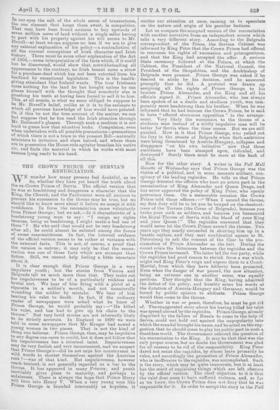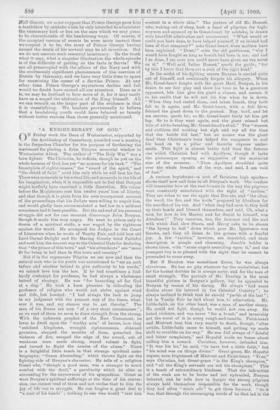THE CROWN PRINCE ' OF SERVIAt RENUNCIATION.
WE wonder how many persons feel doubtful, as we do, whether they have yet beard the truth about the ex-Crown Prince of Servia. The official version that he was so headstrong and dangerous a character that the King, the Church, and the Parliament were all anxious to prevent his succession to the throne may be true, but we should like to know more about it before we accept it with Confidence. In form the renunciation came voluntarily from Prince George; but we ask,—Is it characteristic of a headstrong young man to say : "I resign my rights because, being so headstrong, I might make a bad use of them"? He who said that would not be very headstrong after all ; he could almost be enlisted among the forces of sweet reasonableness. In fact, the internal evidence of the official version seems to be rather at variance with the external facts. This is not, of course, a proof that. the version is untrue; it may only be that the renun- ciation was one of those facts which are stranger than fiction. Still, we cannot help feeling a little uncertain about it.
It is clear enough that Prince George is a very impulsive youth ; but the stories from Vienna and Belgrade tell us much more than that. They make out his impulsiveness to be of a particularly reckless and brutal sort, We hear of him firing with a pistol at a cigarette in a soldier's mouth, and not unnaturally wounding the soldier by mistake. We hear of him beating his valet to death. In fact, if the ordinary reader of newspapers were asked what he knew of Prince George, he would probably say He killed his valet, and has had to give up his claim to the throne." But very lurid stories are not inherently likely to be strictly accurate. In England in 1899 we were told in some newspapers that Mr. Kruger had sawed a Young woman in two pieces. That is not the kind, of thing one believes. Prince George, then, may be impulsive to any degree one cares to credit, but it does not follow that bia impulsiveness has a criminal taint. Impulsiveness way be very foolish and very inconvenient, aud we suspect that Prince George's—did he not urge his countrymen in wild words to shatter themselves against the Austrian rock ?—was of that kind. But impulsiveness, however crack-brained, is not generally regarded as a bar to the throne. It has appeared in many Princes ; and youth inevitably gives place to maturity, and perhaps to sedateness. There is always the hope that Prince Harry will him into Henry V. When a very young man like Prince George is branded irrevocably as hopeless, it excites our attention at once, causing us to speculate on the nature and origin of his peculiar badness.
Lot us compare the accepted version of the renunciation with another narrative from an independent source which tells a very different story. According to the Belgrade correspondent of the Times, the Servian Cabinet was informed by King Peter that the Crown Prince had offered to renounce his rights of succession and primogeniture, and that the King had accepted the 'offer. A curious State ceremony followed at the Palace, at which the Cabinet, the President of the National Council, the President of the Skupshtina, and the Archbishop of Belgrade were present. Prince George was asked if he desired to abide by his decision, and he answered promptly that lie did. A protocol was drawn up assigning all the rights of Prince George to his brother Prince Alexander, and the King and all his officials signed it. Prince Alexander, who has always been spoken of as a docile and studious youth, was tem- porarily more headstrong than his brother. When lie was informed that he had become the Crown Prince, he is said to have "offered strenuous opposition" to the arrange- ment. Very likely the succession to the throne of a studious man instead of a wildly impulsive man will be better for Servia when the time comes. But we are still puzzled. How is it that Prince George, who yelled out his fury in the streets of Belgrade when Serb ambitious were being threatened by Austria-Hungary, collapses and disappears "on his own initiative" now that those ambitions have been stamped upon, ridiculed, and destroyed? Surely there must be more at the back of all this.
NVW for the other story. A writer in the Pall Mall Gazette of Wednesday says that Prince George was the victim of a political, and in some measure military, con- spiracy of the leading regicides. He tells us that Prince George detested the officers who took an active part in the assassination of King Alexander and Queen Drage, and has never approved the policy of King Peter, who openly patronises them. On a memorable occasion the Crown Prince told those officers :—" When I ascend the throne, my first duty will be to let you be hanged on the chestnut- trees of the Terrace (the Corso of Belgrade), because you broke your oath as soldiers, and because you besmeared the Royal Throne of Servia with the blood of your King and your Queen 1" The regieides answered that they would never let the Crown Prince ascend the throne. Two years ago they nearly succeeded in shutting him up in a lunatic asylum, and they sent confidential agents to St. Petersburg to ask the consent of the Czar to the pro- clamation of Prince Alexander as the heir. During the recent crisis the bitterness between the regicides and the Crown Prince increased. The latter led the war party, while the regicides had good reason to shrink from a war which might end. King Peter's reign and expose them to a Court- Martial, from which they have hitherto been protected. Even when the danger of war passed, the new situation, being an extreme one in another sense, was equally perilous. They thought that the King, having admitted the defeat of his policy, and humbly eaten his words at the dictation of Austria-Hungary and Germany, would be forced by public opinion to abdicate. Prince George would then come to the throne.
Whether in war or peace, therefore, he must be got rid of. The exaggerated story.a.bout his having killed his valet was spread abroad by the regicides. Prince George, already dispirited by the failure of Russia to come to the help of Servia, could not hold out against the unpopularity into which the scandal brought his name, and he acted on the sug- gestion that he should cease to play his public part in such a thankless world. The Government referred the question of his renunciation to the Kiug. It may be that that was the only proper course, but no doubt the 'Government was glad for all reasons to be rid of the responsibility. King Peter dared not resist the regicides, by whose leave primarily he rules, and accordingly the promotion of Prince Alexander, who is inoffensive to the regicides, was accomplished. Such is the story, which may be quite inaccurate, but it at least has the merit of explaining things which are left obscure by the official version. The chief objection to it is that the valet does seem ta have suffered violence, and, so far as we know, the Crown Prince does not deny that he was responsible for it. In order to accept the story in the Pall ',tall Gazette, we must suppose that Prince George gave him a deathblow by mistake when lie Only intended to administer the customary kick or box on the ears which we may guess to be characteristic of his headstrong ways. Of course, if the accepted version of events be even more inexact than we suspect it to . be, the story of Prince 'George baying caused the death of his servant may be ell invention. But we do not assume such essential inaccuracy. Be the truth what i may, what .a singular illustration the whole episode is of thedifliculty of getting at the facts in Servia! We are all preoccupied with tho affairs of the Navy and with the enormously significant phenomenon of the coercion of Russia • by Germany, and we have very little time to spare for examining the career of a Servian Prince. At any other time Prince George's mysterious decline and fall would to doubt have earned all our attention. Even as it Is, we may be destined to hear more of it, for it may easily have as a sequel the abdication of the King himself. All we can remark on the larger part of the evidence is that it is unsatisfying. We hesitate provisionally to believe that a headstrong youth could have behaved so tamely without better reasons than those generally mentioned.











































 Previous page
Previous page